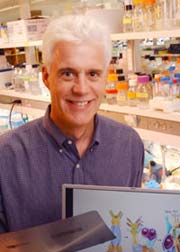UT Southwestern researchers identify gene as essential for vascular smooth muscle development

Dr. Eric Olson, chairman of molecular biology at UT Southwestern Medical Center at Dallas, has found a major mechanism to explain normal and abnormal smooth muscle growth, a finding that could help in developing therapeutics for disorders like hypertension and asthma.
Researchers at UT Southwestern Medical Center at Dallas have discovered a major mechanism to explain normal and abnormal smooth muscle growth, a finding that could help in the development of novel therapeutics for disorders like hypertension and asthma.
Their work appears in today’s issue of Nature.
Smooth muscle cells are essential for the formation and function of the cardiovascular system, as well as many internal organs such as the stomach, intestine, bladder and uterus. Abnormalities in their growth can cause a wide range of human disorders, including atherosclerosis, hypertension, asthma and leiomyosarcoma (a fatal smooth-muscle cancer). The molecular mechanisms that control smooth muscle cell growth and differentiation, however, have been poorly understood.
“It has long been known that many diseases result from abnormal growth of smooth muscle cells,” said Dr. Eric Olson, chairman of molecular biology and senior author of the study. “The new findings are quite exciting because they reveal a previously unknown mechanism that controls the growth and differentiation of smooth muscle cells. Knowing this mechanism, we can think about ways of regulating it to control smooth muscle growth during disease.”
Dr. Olson recently discovered a master regulator of smooth muscle development, a protein called myocardin. This regulator turns on smooth muscle genes by interacting with serum response factor (SRF), a widely expressed protein that binds DNA.
In the Nature study, Dr. Olson and his colleagues showed that the ability of myocardin to turn on smooth muscle genes is counteracted by another protein, Elk-1, which prevents myocardin from binding to SRF. When Elk-1 displaces the myocardin from SRF, it triggers smooth muscle cell proliferation, an effect associated with cardiovascular disease.
With these findings, scientists now have important new insights into the cellular mechanisms that control the growth and differentiation of smooth muscle cells. The findings also offer many interesting opportunities for therapeutic intervention, said Dr. Olson, director of the Nancy B. and Jake L. Hamon Center for Basic Research in Cancer and the Nearburg Family Center for Basic Research in Pediatric Oncology.
Other UT Southwestern contributors to the Nature study were Zhigao Wang, student research assistant in molecular biology, and John McAnally, research associate in molecular biology. Researchers from the University of North Carolina, Chapel Hill, and Tuebingen University in Germany also contributed.
The research was supported by grants from the National Institutes of Health, the McGowan Foundation, the Donald W. Reynolds Foundation, the Robert A. Welch Foundation, the Muscular Dystrophy Association and the German research foundation Deutsche Forschungsgemeinschaft.
To automatically receive news releases from UT Southwestern via e-mail, subscribe at http://www.utsouthwestern.edu/utsw/cda/dept37326/files/37813.html
Media Contact
More Information:
http://www.swmed.edu/All latest news from the category: Life Sciences and Chemistry
Articles and reports from the Life Sciences and chemistry area deal with applied and basic research into modern biology, chemistry and human medicine.
Valuable information can be found on a range of life sciences fields including bacteriology, biochemistry, bionics, bioinformatics, biophysics, biotechnology, genetics, geobotany, human biology, marine biology, microbiology, molecular biology, cellular biology, zoology, bioinorganic chemistry, microchemistry and environmental chemistry.
Newest articles

Properties of new materials for microchips
… can now be measured well. Reseachers of Delft University of Technology demonstrated measuring performance properties of ultrathin silicon membranes. Making ever smaller and more powerful chips requires new ultrathin…

Floating solar’s potential
… to support sustainable development by addressing climate, water, and energy goals holistically. A new study published this week in Nature Energy raises the potential for floating solar photovoltaics (FPV)…

Skyrmions move at record speeds
… a step towards the computing of the future. An international research team led by scientists from the CNRS1 has discovered that the magnetic nanobubbles2 known as skyrmions can be…





















